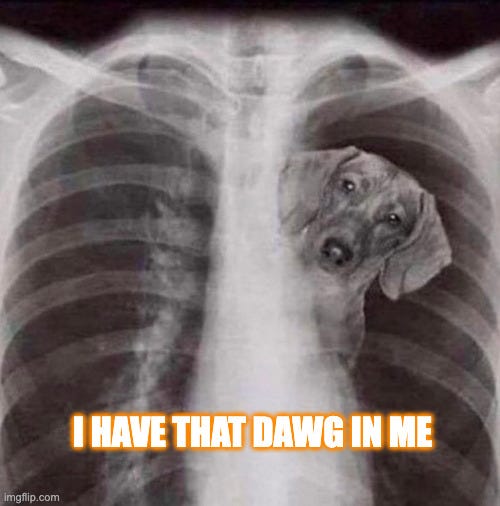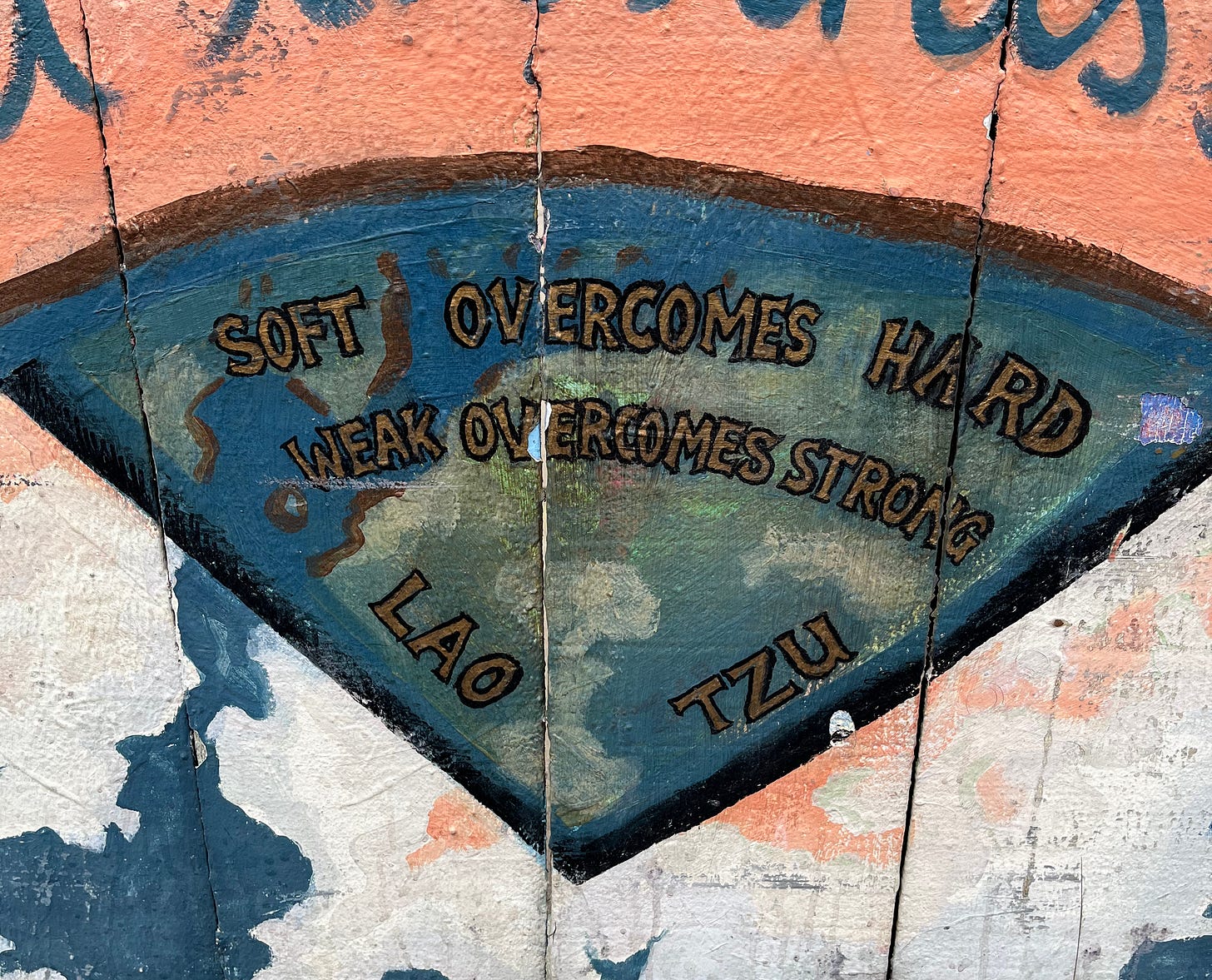he's got that dawg in him, but it is a different kind of dawg
how I learned to embrace my (male) softness in a world that teaches us that masculinity is defined through toughness

Growing up in the y2k hip-hop/basketball world, being perceived as tough was essential for earning respect. In our narrow-minded worldview, being labeled as soft meant you were useless — not for real. It was the worst thing that could happen to your reputation; you lost your standing, your respect. It’s shameful to admit, that I as well subscribed to those beliefs — I despised people I viewed as “soft”.
Especially teammates who didn’t fight until the end, who didn’t hustle for every loose ball or who folded under pressure. I felt disdain for them when they chose to rest or stop playing when getting injured or sick. Be assured, they were right in doing so. They were listening to their bodies, practicing self-love and self-care. But my twisted thoughts were: „what a pussy“.
I had learned that you have to fight through it, tough it out — be a „man“. That was the credo we were socialised with and we held each other to it: „Whatever you do, just don’t be a pussy“.
anger is tough, crying is weak
There was this constant pressure to be/act tough, to perform and to never fold under pressure — to show no weakness, no signs of vulnerability. The only acceptable emotion was anger. In a strange way, it was even considered cool to lose your shit and rage. Anger is tough, crying is weak. Violence or emotional outbursts were framed as brave and cool.
Through movies, lyrics and watching the older guys we looked up to, we absorbed the idea that being a man seemingly meant being vicious. It shaped these completely distorted beliefs about gender norms, about what is manly, what is strong, what is weak.
DMX was the soundtrack to this pit-bull mentality — "I trust dogs more than I trust humans" — never backing down, pretending to not be afraid of anything. If the tough facade cracked, you were instantly labelled soft — not ready for life. This poisonous mindset created so much unnecessary pressure. It kept us from expressing our true feelings, from listening to our bodies, from giving and receiving love. It robbed us of connection and intimacy.
Writing all of this still fills me with shame: how could I believe this bullshit and live by it for so long? Thankfully, the world has changed. We’re in a more open-minded time than the 90s or y2k era. Gen-Z is far more progressive, and gender norms are finally starting to evolve.
Likewise, I’m living a different life with an updated mindset, miles away from my early days of toxic masculinity. I’m surrounded by a bubble of progressive and open-minded people, who would never associate softness with weakness. And yet, sometimes I forget how this mindset is still omnipresent in many circles — especially in sports and hip hop culture. I don’t need to tell you that patriarchy is still very much alive.
not just any dog, gotta be a pitbull
I see it every time I’m around by my old bball friends, or when I peek into their group chat and catch their slang. For instance, they use “that’s tuff” as a badge of respect. It’s tuff to hit a game-winner in somebody’s face or it’s tuff to have a million followers.
a stamp of approval
When someone is mentally tough, able to perform under pressure and grind through anything, he gets praised as “he’s got that dawg in him”. A stamp of approval — you passed the toughness test. Meme culture created an x-ray image of an human chest with a dog in it, proving that this person literally has that dog in him. Of course, the dogs in those x-rays are always fighting dogs, pitbulls straight out of a Ruff Ryders video. As DMX put it: "not just any dog, gotta be a pitbull" — get that soft/gay/weak shit outta here.
And here’s the thing: I actually like the meme. It’s funny. But it’s also soaked in this poisonous ideology. I love dogs. And I’m sure I’ve got a dog in me too — but it’s a different kind of dog. It is not built for violence. It is soft, cute, playful. A little anxious. Maybe a bit chubby and clumsy. And definitely not with a pit-bull mentality.

Vice versa, if someone fails the test — folds under pressure, shows fear or breaks down — then “he ain’t got that dawg in him”. That person gets instantly labelled as soft. Not built for it. Not a real one. The meme for these so-called “losers” is “The Charmin Ultra Soft Family”, a reference to the acclaimed softness of Charmin toilet paper and this sweet cartoon bear family:

questioning my own street toughness
Secretly, I always knew that I wasn’t as tough as I pretended to be. I didn’t grow up in the hood, and while my father was absent, I had a loving mother who cared for me deeply. I was an extremely shy boy, hypersensitive and crippled by social anxiety.
I never got into any real street-fights. Just the thought of punching someone full-force in the face scared me. I’d imagine the sound of bone cracking, the possibility of shattering someone's facial bones and questioned my own street toughness. Would I be able to fulfill these odd expectations for male adolescents? I didn’t think so.
And I tried to hide these perceived weaknesses from others — hopefully, no one will notice how cowardly I secretly am. Hiding my softness, my sensitivity, my emotions — it wasn’t masculine to be this way. Instead, I was performing. Showing no feelings, presenting as unbothered.
unlearning deeply rooted beliefs
Even though I've distanced myself from that former life and circle of friends, I’m still in the process of unlearning the remnants of those old masculinity beliefs. The thing about early-acquired, deeply rooted beliefs is: they can be bloody persistent.
Sometimes I think I've finally gotten rid of them, that I’ve finally liberated myself from those backward notions. And then, out of nowhere, the residuals of this life and mindset I've left behind come creeping back into my head. These beliefs definitely got that dawg in them too, they doggedly pursue us, they are not easily shaken off. They don’t go down without a fight.
Which is why I find it even more important to share some of the tools that helped me unlearn them.
toolkit for unlearning toxic masculinity beliefs:
naming the beliefs: first step is naming the limiting or destructive beliefs. you can only unlearn something, if you can name it. bringing it to paper or verbalising it also helps. try journaling about your beliefs, how do they make you feel? how would you feel without them?
surrounding yourself with the right ppl: realising that these beliefs are not true and surrounding yourself with people who support you in the reframing or who are at least willing to discuss them. I don’t like cutting people off. But if there are ignorant people, not willing to change their perspective and who want to uphold this type of masculinity, you are allowed to hang out with more mature people. Don’t fall for toxic loyalty, thinking you have to stay friends with them. Asking: „Do you want to be cool or you want to be free?“
finding new role models: really helpful to find new role models with healthier mindsets, a new definition and deconstruction of masculinity. Men who embrace their femininity, their softness, who are vulnerable and emotional. This is real strength. Don’t give them toxic fools any power over defining what strength, coolness or masculinity means. (→ book list at the end of the post)
reframing beliefs with the work: one tool that helped me fight & reframe my dogged beliefs is Byron Katie’s „The Work“. It's an easy practice with four questions, sometimes may even feel a bit too easy to have faith in. But trust me, it helps immensely to reverse thoughts and create new affirmations, which you can then use to overwrite the old beliefs.
Example of “The Work” by Byron Katie:
I have the belief: “Men need to be tough”
The four questions:
1) Is this true? Maybe first I would still say yes, because the belief is deeply rooted. Men need to be tough, don’t they?
2) Can you absolutely know that it’s true? Maybe now I say no, because how can I be absolutely certain that it is true?
3) How do you react, what happens when you believe that thought? I feel a lot of pressure, I feel like I am wrong the way I am, I feel like I am not allowed to show my authentic self or to have any feelings.
4) Who or what would you be without the thought?I would be liberated, less pressured to be some way, allowing myself to feel my feelings, I would be softer, more loving, more able to receive love.
Next step is to turn that thought around and to contemplate how that new thought is as true or truer:
”Men don’t need to be tough” or “Men can be soft”
=> is this as true or truer? hell yeah
=> now you can examine how this new belief would make you feel. Plus you have an affirmation you can use daily or weekly to establish the new belief. Write it on a piece of paper and stick it on your wall or write it in your notebookmeditation: last but not least, the all-purpose weapon for mental health issues does ofc also help with shaking off old beliefs. Being able to observe your thoughts makes it easier to dismantle and distance yourself from them. Having a consistent meditation practice is key for gaining sovereignty over your thoughts - being able to decide which beliefs should take up space in your mind. It feels empowering.
~ affirmations for embracing your softness ~
I am capable of loving all of who I am. I am willing to live all of who I am.
I am proud of my softness. I am proud of my emotionality.
I am allowed to be soft. I am allowed to not be tough.
Crying is not weak, crying is healthy.
I don’t have to fight. To surrender is not weak. It is brave.
I surrender to love.
I can’t control everything, I surrender to life.
I allow myself to feel my emotions, whatever comes up is valid.
I allow myself to move on from old beliefs.
I know my truth and won’t let myself be led astray.
~ recommended books ~
JJ Bola - Mask off, Masculinity redefined
=> In Mask Off, JJ Bola exposes masculinity as a performance that men are socially conditioned into. As a former bball player himself, he knows the masculine sports & hip-hop world.Bell Hooks - The Will to Change: Men, Masculinity and Love
=> Everyone needs to love and be loved - even men. But to know love, men must be able to look at the ways that patriarchal culture keeps them from knowing themselves, from being in touch with their feelings, from loving.Terrence Real - How Can I Get Through to You?: Closing the Intimacy Gap Between Men and Women
=> unearthing the causes of communication blocks between men and women, drawing on his pioneering work on male depression - explains how both men and women can escape the roles tradition has assigned them and develop the skills that lead to intimacy
=> he also coined the terms political and psychological patriarchy





